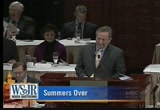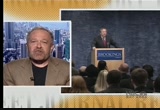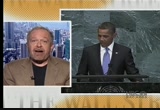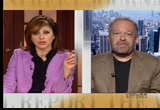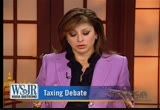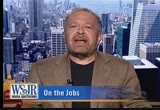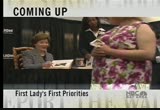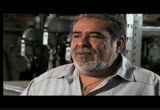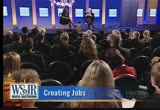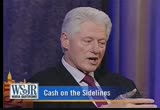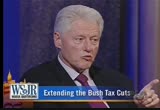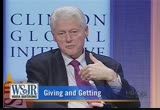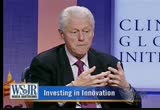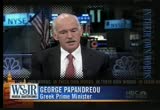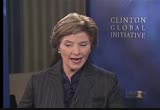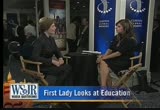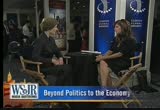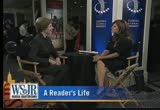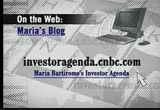tv Wall Street Journal Rpt. NBC September 26, 2010 4:30am-5:00am PST
5:30 am
hi, everybody, welcome to the "wall street journal report." i'm maria bartiromo. another shake-up at the top of the obama administration. a key adviser steps down. what does it mean to the markets? your portfolio, and who will replace him? also, my discussion with president clinton. we'll talk about the economy, jobs, and the highest office in the land. >> i actually had that job once, and it's harder than it looks. and read all about it. former first lady laura bush on global lessons in education and how to build literacy in the 21st century workforce. "wall street journal report" begins right now. >> this is america's number one financial news program, the "wall street journal report." now maria bartiromo. >> here is a look at what is
5:31 am
making news as we head into a new week on wall street. the markets and financial community will be closely watching to see just who president obama will nominate to replace another key economic adviser who is leaving. this week lawrence summers, the director of the national economic council announce head will return to harvard university at the end of the year. this comes on the heels of peter orszag and christina romo. summers is regarded as being friendly to the business community and a voice of moderation in the administration's economic policies. the markets got off to a rip-roaring start on monday, up about 150 points on the dow, but then broke a five-day winning streak on wednesday, and fell again on thursday. the markets rebounded big on friday. even though it may not feel lying it. >> america's great recession is officially over. the national bureau of economic research, a group which monitors business cycles says the recession ended in june of 2009. it began in december of '07 and was the longest of any recession since world war ii. the federal reserve ended a
5:32 am
one-day meeting and kept interest rates at near zero. in its statement, the feds said that the pace of economic recovery is likely to be modest in the near term, and did not take any additional steps to stimulate the economy. but the fed said it was prepared to do so if conditions weakened further. well, the great news is the great recession may be technically over, my next guest says the aftershocks are still to come. joining mow maine now is robert reich, former secretary of labor under president clinton. his new book is "aftershock, the next economy and america's future." great to have you on the program. welcome back. >> hi there. >> what does larry summers' departure mean for obama's economic team? >> well, it's a little bit of a hiccup. it means that obama actually has an opportunity to push the reset button, have new people around him, new advisers create the impression, if not the reality, that there is going to be a new face to economic policy. it's not bad, it's actually expected and i think it's appropriate and probably good. >> so is it appropriate because
5:33 am
someone had to take the fall for the fact we've got this deepening unemployment problem? why do you think it's appropriate? >> well, it's appropriate in part because economic advisers, particularly in periods like this are not going to last more than two years, regardless. and economic adviser who is from academia is probe going to back to preserve tenure. also kind of reading between the lines, i think larry summers might have said to himself i don't want to take the fall if democrats get such a licking at this midterm election that people really are looking for a fall guy after the election, and it might be good to at least signal that i'm leaving before the election. but as a practical matter, look, the first phase of the obama administration particularly economic policy is now over, and it is probably time to have some more and different adviser. >> do you think the president will appoint someone with a business resume to his inner circle? you know the criticism throughout that there isn't
5:34 am
anybody in the administration who has worked in business. what can he do to improve confidence in his handling of the economy? >> well, i think there are people in the white house who were certainly floating business executive names, and that floating process, maria, you know as well as i do is a process of sort of waiting and seeing what kind of reaction those floats gets. and in terms of your second question, what can the president do to improve his relationship with the business community. i think the most important thing he can do really is to show the business community that he understands enough about the economy to get us back on a growth path. >> where do you think we are in this recovery? what is the danger ahead for the fourth quarter of the year end 2011, which we continue to hear we're still into the great recession? >> i don't see much growth ahead, maria. 1.6 annualized growth second quarter. i think the third quarter is going to be very similar. i don't see us growing fast enough, at least in the foreseeable future to bring unemployment down very much, if at all.
5:35 am
it's not only going to have negative repercussions perhaps extending to 2012, but also the burden and pain in the population is enormous. you know, there is no secret to me why you have all this anger, this bitterness, this frustration, this anxiety expressing itself in a politics of resentment. that's what has happened every time in our history when you get so many people so concerned about their jobs. >> if the bush tax cuts expire for those making more than $250,000 a year, what kind of an impact would you expect on consumer spending, incentives to the business community to create jobs, produce more products? tell me the impact of that? >> well, i take a different position than your colleague larry kudlow on this. i think they should be extended for the bottom 98%, but for the top 2%, save a much larger proportion of their income than they spend. to give them an additional year, just even one year would be $36 billion. that's a big hole out of the federal budget, and we cannot
5:36 am
really afford it. millionaire families would get a $31 million windfall. again, because they're saving so much more than everybody else, they're not spending all that much, they're not going to invest in business capacity in an environment when consumers are coming out from under huge debt and are not going to consume very much. the short answer to your question, i do think the right thing to do would be to extend the tax cuts for the bottom 98%, but not for the top 2%. >> you know, here we are in this point of the recovery where we really should be talking about growth. we should be talking about a little more vibrancy than we're actually seeing. and i wonder if the president made a mistake by not making job creation a real job creation program his number one theme on his agenda, rather than pushing health care reform so aggressively and making that his number one point on the agenda. was that a mistake? >> i think the real mistake, maria, to the extent there was a mistake, was not connecting the
5:37 am
dots and showing the public how health care reform actually related to the underlying crisis of stagnant middle class wages and benefits, and how reforming wall street also was necessary to actually revive middle class wages. and why the stimulus was very important. in other words, there are a lot of initiatives out there that republicans took up and said oh, the president is spending so much money, and causing the economy to go under because of all this spending. where the president could have and should have explained in very dramatic and obvious terms to the public that all of this was about reversing a trend that is a long-term trend that actually reached in fact -- kind of demonstrated itself finely, was unmasked by the great recession, and people in the middle have not had a raise in 30 years. the median wage of the male earner today is less adjusted for inflation than it was 30 years ago. how can the middle class, maria,
5:38 am
how can the middle class actually turn around and spend enough to keep the economy going when there has been such a hollowing out? >> robert, great to have you on the program. with we so appreciate it. >> thanks, maria. >> thank you so much. robert reich joining us. turning charitable promises into a reality. my conversation with president bill clinton about the economy, jobs, and innovation at the clinton global initiative. and from clinton to bush. former first lady laura bush will join me to talk about life after the white house and her focus on women's education. as we take a break, take a look at how the stock market ended the week. [ ruiz ] reliable tools started as a brick and mortar store.
5:40 am
we sell lathes, mills, high-tech equipment. i had an idea to go ahead and put up a couple of items on ebay, and they brought more than our expectations. meg whitman gave me the tools to expand globally. we sell to australia, india... that big blue machine over there? it's going to malaysia on wednesday. with ebay, she created jobs for millions of people. with meg's creativity, she'll be able to create jobs here in california. i'm mariano ruiz and i'm a meg whitman success story. president clinton has been a busy man since he left the white house. he is turning promises into a reality, working with businesses and political leaders across the
5:41 am
globe to improve lives after establishing the clinton global initiative to help realize change. this week i sat with him before a live audience at the cgi. we talked charity, taxes, and jobs. >> i think we have to target the areas where we know we can grow more jobs. we have to find ways to finance them and go where the money is. and we have to make sure we have people who can do those jobs. the areas that are most likely to produce big job growth are small business, because it's always the number one job generator, manufacturing, because there is lots of evidence we can bring back manufacturing after a long dry spell, and clean energy, which is related to manufacturing technology and a lot of other things. the first thing i think we should do is to pass the package to give small business a bigger write-off if they actually expand their operation. so you spend the tax cut for
5:42 am
more jobs, expansions, equipment. the second thing is i think we should pass this package of thing to keep us more competitive manufacturing here. we can't have any more stimulus and the deficit is big and all that and everybody is concerned about it, where is the money going to come from? banks have about $1.8 trillion in cash reserves uncommitted alone. american companies have $1.2 trillion in cash in their treasuries. that's a total of $3 trillion. about 80% of, that $1.2 trillion is held by 75 companies. the one thing that nobody is talking about, if it were me, i would sit down with all 75 of them to see whether if there was a consensus of what four or five things can be done to get them to invest that money here. and even more significant, we need to figure out what it would take to get the banks to loan money. because as you know, at conservative ratios, banks can loan ten times their uncommitted cash reserves. so they could loan $18 trillion,
5:43 am
and it would be far more conservative than what happened that caused this meltdown. >> where are you on the extending tax cuts for everybody? the bush tax cuts? would that help the economy right now? >> well, as compared with putting the money in the bank and doing nothing with the money, i would vote to extend them. however, if i knew the money -- and i'm in that category. so we're talking about extending my tax cuts. if i knew that my money would instead go into creating a fund to train all the workers, i would rather do that. so we can do it that way, i'd love to give up my tax cut, as long as i knew it was going to train unemployed workers to go to work because it could create a lot more jobs. >> in 2009, corporate giving accounted for only 4% of total contributions to charity. 4%. why is this number so low, mr. president? >> if you're going to give money
5:44 am
from a corporation that is publicly held with investors, you have to be able to make a case that in an interdependent word, you've got to improve the environment in which you operate, whether it's around the corner or around the world. and one of the things that i'm proudest of was when we started this, only 35% of our commitments six years ago had any corporate involvement. this year 54% do. they've got to be able to say that doing good also helps the people who believe in them, not just investors, their customers and their employees do well. i believe that in and interdependent world, but it's a case they have to make. >> mr. president, when you were in office, the innovation was coming from technology. where is the innovation coming from next? >> i was very fortunate when i became president. information technology rifled throughout the economy. it got out of corridor 128. it got out of the interconnect companies in the washington,
5:45 am
d.c. area, the video game areas in texas, and it rifled. in silicon valley, it rifled through every aspect of the american economy. 35% of our wage growth. >> wow. >> every big country needs a strategy to have something like that every five to eight years. and my view is that we already know the answer to that for america by look at what happened in this last decade. there are four countries that will beat their clean energy targets in the kyoto protocols -- denmark, sweden, the uk, and germany. all in different ways. every one of them had a lower unemployment rate, a higher growth rate, and less inequality than the united states because they embraced the clean energy future, all in different ways, and their economy exploded. so we can still -- [ applause ]
5:46 am
we can still tap that. in the next decade, ainge lot will come out of biotechnology, nanotechnology, all kind of things yet to be perceived. >> my thanks to president bill clinton. cutting a country's deficit. it's what international political leaders were talking to me about this week. here they are in their own words. >> we're on target. we took very difficult measures, a lot of pain. we cut our budget target for end of 2010 40%. we're on target by cutting the deficit 40%. >> we have to really look at the age and see how we can develop buying as a services club, how we can grow the strength of our base, diversify our economy and really compete on a global level. >> i don't believe that to have a single currency in europe now
5:47 am
for 16 countries is a rational way how to do business, and how to run the economy. the currency for totally -- different countries. >> up next on "the wall street journal report," laura bush has turned a new page since leaving the white house. find out her goals for global literacy, and what she is reading i was driving in northern california. my son was asleep.
5:49 am
i really didn't see it coming. i didn't realize i was drifting into the other lane. [ kim ] i was literally falling asleep at the wheel. it got my attention, telling me that i wasn't paying attention. i had no idea the guy in front of me had stopped short. but my car did. my car did. thankfully, my mercedes did. [ male announcer ] a world you can't predict... demands a car you can trust. the e-class. see your authorized mercedes-benz dealer for exceptional offers through mercedes-benz financial. ♪
5:50 am
lady bird johnson once described america's first lady as an unpaid public servant elected by one person, her husband. since leaving the white house last year, laura bush has focused on the social issue she is passionate about, education and economic women's empowerment around the world. i spoke to the former first lady about her work and her association with the clinton global initiative. >> a panel talking about harnessing human potential. there were two parts of it that are most important to me. obviously literacy. if people are literate, if they can read, they're much more likely to be able to be a part of their economic lives in their communities or in their country. we know when we look around the world that where women are marginalized, where they're not allowed to be a part of civic life or the economic life of their country, usually we look
5:51 am
at a failing country. >> tell me about education today. because everybody is looking at, you know, the world and how it's changing so dramatically. china growing as fast as it is and india, and latin america, brazil in particular seeing an enormous amount of money float. people are trying to figure out how am i going to do well. how is the average american going to do well when you have such competition around the world. do we teach our students the right skill sets that are required to navigate this new normal? >> i think that's something we need to work on. there is no doubt about it. we need to make sure the basic skills that you need to be able to succeed and read, so we need to make sure that all children in our country learn to read and read wisely. but also, we need to look at what we're teaching. we need to teach more science, more math. and we need to emphasize those. and instead of just having one size fits all curriculum across the united states, we need to
5:52 am
figure out ways to have upper-level science and math classes, even for high school students. because when they go on, they're really prepared to compete worldwide. >> you've been spending a lot of time on these issues, and thank you for that, by the way. tell us what else you have been doing with your time, and how you feel about the current political landscape. >> well, george and i are both working on policy, continuing to work on policy. george said we're through with politics, which is a great relief, really in a lot of ways. i don't have to comment anymore on politics. but we do want to continue working on the things that we were most interested in, which include economic opportunity and education, global health and human freedom. and we're doing those through the bush institute. it will be part of the bush library at smu in dallas, my alma mater. we have already started the institute. we have had a number of conferences, including the u.s. afghan women's council meeting
5:53 am
in march, last march with a focus on literacy and education for girls. >> are you happy with where the country is right now? would you like to see change in terms of policies, in terms of education? >> you know, of course. i think everyone wants to see a change in the economy. and i think that's what people worry about the most. obviously, when they're losing jobs or losing their homes, it's very, very worrisome. my dad's generation lived through the depression. and they were very frugal because of that. you know, they were much more frugal than my generation is. they were savers. and we need to do that again. we also need to make sure that young people, high school age students have financial literacy, that they know how to make a budget for themselves and they know how to live within a budget. it's very important that we add financial literacy to high school curriculum. >> and you're such a proponent of reading and literacy. i'm interested. do you have a digital e-reader
5:54 am
or are you still sticking to paper? >> i have a kindle. george has the new ipad. >> okay. >> we're both reading that way. and of course have i such a big stack of books on my bedside table, i read those as well. but i really enjoy being able to read on the screen to make the font bigger now that i'm a certain age. that's a lot nicer to be able to read and see well. >> technology has changed everything. >> the other great thing is being able to get that book in the middle of the night in 35 seconds. that's really terrific. >> it is. mrs. bush, thank you so much for your time today. and thank you for the service to our country of course. >> thanks. >> laura bush. up next on the "wall street journal report," the news this upcoming week that will have an impact on your money. and rewarding good citizenship. recognizing the best of the best at the global initiative. workers who lost their jobs to the spill. i'm iris cross. we'll keep restoring the jobs, tourist beaches, and businesses impacted by the spill. we've paid over $400 million in claims
5:55 am
and set up a $20 billion independently-run claims fund. i was born in new orleans. my family still lives here. i'm gonna be here until we make this right. we need directions to go to... pearblossom highway? it's just outside of lancaster. sure, i can download directions for you now. we got it. thank you very much! check it out. i can like, see everything that's going on with the car. here's the gas level. i can check on the oil. i can unlock it from anywhere. i've received a signal there was a crash. some guy just cut me off. i'll get an ambulance to you right away. safely connecting you in ways you never thought possible. onstar. live on.
5:56 am
5:57 am
the schools become so bad...the state has to take them over. it was "largely a bust," he admitted. jerry brown. failure as governor. failure as mayor. failure we can't afford now. for more on our show and our guests, check out wjsr.cnbc.com. hope you will check it out. now a look at the stories coming up in the week ahead that may move the markets and impact your money this week. tuesday the s&p case shiller home price index will be released. this index tracks the housing market in 20 stays cross the country. and the latest reading on consumer confidence out on tuesday as well. thursday is the last day of september and the third quarter, and the final reading of the second quarter gross domestic product will be reported. third quarter readings are just a few weeks away. friday auto companies will give us their total sales for the month of september, and the
5:58 am
latest figures for personal income and spending also out on friday. finally, i was honored to participate in the clinton global citizen awards at this year's cgi. the star-studded nightcaped off this week's event. the honorees are chosen on their approach to addressing global challenges from the public and private sectors. avon's ceo andrea jong and the president of the dominican republic among others accepted rewards for their leadership by example that will do it for us today. thank you so much for being with us on the program. next week we'll be taking a look at retirement. getting past the roadblocks to secure your financial future. each week
96 Views
IN COLLECTIONS
KNTV (NBC) Television Archive
Television Archive  Television Archive News Search Service
Television Archive News Search Service 
Uploaded by TV Archive on

 Live Music Archive
Live Music Archive Librivox Free Audio
Librivox Free Audio Metropolitan Museum
Metropolitan Museum Cleveland Museum of Art
Cleveland Museum of Art Internet Arcade
Internet Arcade Console Living Room
Console Living Room Books to Borrow
Books to Borrow Open Library
Open Library TV News
TV News Understanding 9/11
Understanding 9/11
